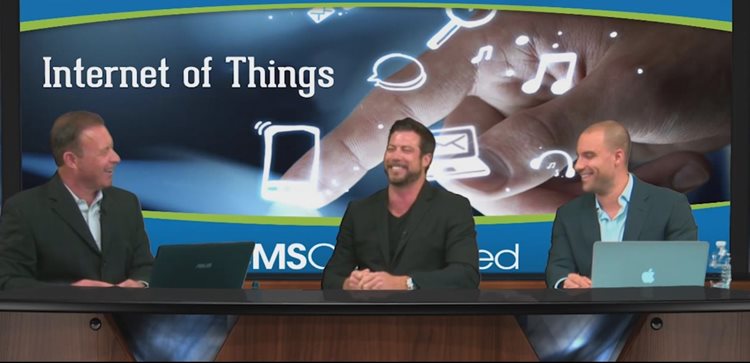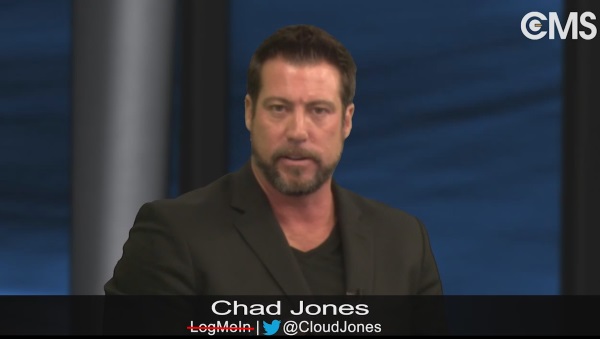Understanding The Internet of Things (IoT) with Chad Jones, Scott Liewehr & Butch Stearns
The following is a transcript of the recent CMS-Connected video conversation with Chad Jones on the Internet of Things.
To save your spot for the next show, please visit this link: Register for the Evolution of Web Engagement (Sept, 30)

Butch: when you hear that phrase; the Internet of Things, what first comes to mind?
Chad: Well, first, the Internet of Things is just a hyped term; it’s at its peak right now on the ‘hype cycle’ as per Gartner. You hear this term in various iterations such as the Internet of Everything, Industrial Internet, Internet of Services, etc…
At the end of the day you’re looking at taking our physical world and through very cheap sensors and actuators, take this information and insert it directly into software over the internet.
So, In the past you needed a ‘carbon based subjective sensor’ - that means us :) – sitting in the middle to see if for instance my refrigerator broke. This would lead to a reactive phone call to a support desk. But, perhaps it’s a holiday and a few days go by so we lose $50 in spoiled food. Now say that fridge is actually a scientific research freezer and it goes down with $200,000 worth of material inside. That’s a very expensive outcome. So we need to be able to predictively look at potential problem areas using these sensors then input this feedback into our business systems.
"It’s going to change everything we know…"
Scott: Thanks Chad, good point on the Gartner hype cycle status which categorized this term (IoT) based on what its potential is at the moment. But where do you think we are in terms of tapping into that potential? We’re seeing more proclivity of businesses to include web based access to ‘these things’ but is anyone truly leveraging this insight and data?
Chad: An analyst colleague of mine referred to this whole industry as embryonic; that’s a good way to look at this thing at the moment. Even though, the IoT is apparently going to grow into a $19 trillion industry by 2020 and anything greater than the GDP of the country is pretty exciting. I hope that it reaches a fraction of that estimate.
But generally I find that companies are galvanized by the concept but are stuck behind the ‘let’s internet connect something’ fanfare without a true understanding of their needs. Organizations need to step back and look at this industry as a business enabling tool. How will businesses react when any sort of dark data out there is suddenly made available to them; what would that mean?
For me the industry is just starting to understand a little bit of that concept; they are researching how they can tie this data into their business cases.
Scott: It’s funny how the IoT while labeled as a very ‘hyped’ term is also fueling the Big Data conversation which in itself is another overly hyped term. It seems to be only compounding the data issue and the necessity to have that conversation.
Chad: True, we’re just ‘stuffed’ with data and it’s only getting worse. One the other hand, Big Data is an interesting term which is often looked at as this ‘Big Data problem’. The conversation is, we need to get a hold of it all and analyze it and whatnot. For instance aerospace, GE, oil and gas are churning out terabytes of data each day from the various sensors and they represent large enterprise markets. However, what really matters is the relevance of the data. Petabytes of data that isn’t relevant to my business might as well be zero bytes of data. A perfect example of this is a biolabs company with a ‘connected’ freezer that I’d be surprised if it generated a gigabyte of data per year. However the value of the data is enormous and that’s difficult to put a price on. So if we attribute Big Data to ‘volume of data’ this isn’t even that. So I consider this is an IoT thing but not necessarily a Big Data thing.

Butch: While we’re on Big Data, what effect that the evolution of the internet of things will have on Big Data? The ‘challenge of Big Data’ in my view is getting the right data, into the right hands at the right time. Will this challenge be made easier with the IoT or harder?
Chad: That’s a good question, I think in some cases it will become easier simply based on the ease of access to the information. In that previous biolabs example, a relatively small amount of data will drive a large amount of actionable business sense. But at the moment it seems that while we are collecting vast amounts of data, it’s the emergence of analytics startups that are taking the initiative of churning through the information to extract more meaning from it.
I like to use the analogy of cryogenic suspension; I can freeze someone but I don’t know how to bring them back today; in 50 years I might now how to do that.
It’s the same with Big Data at the moment; let’s get all the data in and someday analytics will evolve to the point of siphoning the meaning from it.
Butch: As we know a large part of the IoT is machine to machine communication (M2M), and we grew up with HAL from 2001 A Space Odyssey. Today we have machines thinking like humans to sift through the right data and deliver it to the right systems, whether that be CRM, CMS, marketing automation, etc… The things we heard about as kids are right here in front of us.
Scott: Yes, it’s pretty sweet! This will transform the way businesses operate, enabling data analysis to build efficiencies into their systems. There are infinite possibilities now, not only with personalization but we can tap into the context of the individuals experience both on web AND with devices around them. The application of the IoT toward customer experience is completely crazy to think about; just crazy.
Chad: That’s totally right, the idea of ‘Interconnectedness’ is something that we’ll see evolve with the industry. Currently the info is relatively silo’d; fairly linear. Take for instance a wearable device; a heart rate monitor. Think about how this info can be shared with your GP who can see a trend over time, or when this info is sent to a connected research lab which then tailors research based on that along with millions of other sets of anonymous data which is then available to emergency room attendants, which may just save your life. It’s connectedness like this that will enable that enlightened future.
Butch: So, moving past this, how will automation flourish under the new age of the IoT?
Chad: Automation isn’t just in the physical side of things such as in manufacturing and such; it’s in business systems as well. Workflow and similar governance mechanisms are there but still require a human to kick them off in a subjective way. So as objective information flows in from the IoT, it’s going to start kicking off automation and workflows in all manner of business systems. For instance a business workflow which delivers a software response or perhaps is triggers a physical process that has been engineered or perhaps the environment automatically reacts to you such as with beaconing technology. With our pocket technology it’s essentially a representation of ourselves in the digital world (Matrix) and walking into a room we could see personalized reactions from lights, doors, entertainment systems, coffee makers, robot butlers; okay maybe not robot butlers, but soon!
Butch: Totally, I mean that’s here now. We don’t need to imagine it, because that already exists in people’s homes. It’s not completely main stream but it’s a reality.
But tell me how does that affect CMS and the content delivery industry. Advance the equation there.
Scott: This strikes right at the content as a service (CaaS) model for me. Companies are quickly establishing that separation of content from presentation and prepare for the future of contextual delivery.
For example: In order to deliver any manner of automation your systems must be ready to receive the expected data from the IoT. Is the content in the CMS prepared and structured appropriately enough to deliver the personalized experience in real time to the individual personas and create extremely relevant and customized experiences? For instance if a visitor is in the book section, by way of social connect we know the age and gender of the visitor we could display reading material statistically relevant to this demographic. This is an exciting aspect of the IoT when used to evolve personalization in the physical world.
Chad: Augmented reality is also another stepping stone to the future of advertising and IoT. For instance there’s a subway billboard in (Stockholm) that displays a photograph of a woman with long hair. Attached to the display unit are various sensors that measure wind speed, and when a train enters the station the content adjusts and blows her hair as if she is standing among the other people on the platform. This example changes the whole experience of the display to incorporate elements from the physical world that bystanders can feel at that very moment - the air turbulence from the train.

Another example could be a billboard next to a roadway that measures traffic speed. If traffic is fast, the experience is split second imagery so as not to distract from driving. However if traffic is gridlock, the ads can be more experiential and detailed. This is another perfect example of switching content based on conditions in the physical world.
Scott: Exactly, that’s an excellent example for us in the CMS world, if we’re managing that content we need our systems to be prepared to receive that sensory information and then react automatically based on the data (vehicle speed, air velocity in the train station, is it day, is it night, etc…)
Butch: Fantastic discussion gents. We’ve talked about some very cool use cases; there’s also the NEST thermostats that are talked about quite a bit in the connected home conversation. FitBit is a good example of wearable, connected technology.
In closing, if you could both chime in here, how is the CMS industry going to change as a result of the IoT; realizing that we have just touched on this, consider a closing comment on that; something that we haven’t discussed already.
My take away here is that we’re seeing a great emphasis on the value of analysis and research of the data becoming increasingly important. The point being, what you feed into the IoT could be the start of the engine that enables high value lead generation, content delivery, automation, etc…
Chad: Well, technology for technology sake that doesn’t serve a higher business principle is a concept that is doomed to mediocrity or failure. With the potential of being literally drowned in data, companies, more than ever must develop a sound strategy from which to collect, process and respond to the volumes of information that they will be receiving.
We’ve seen some spectacular successes and also some equally spectacular failures inside of the Internet of Things simply because the business cases weren’t fully thought through.
We will see dramatic changes with how advertising is done at a retail level along the lines of the Minority Report style future, the medical field will change and so will how we interact with our doctors. The connected auto world will drastically change with our safety and energy consumption being the driving factors. On the other hand, there is Prism and the NSA out there who can look at things and if our whole world is wired up and being monitored, can that be used for nefarious purposes? We need to be vigilant here but also understand that it will fundamentally change how we discover, interact and understand our world.
Scott: I like that it introduces the notion that content has the potential to evolve something that is far more than just a marketing function in a business. Marketing is near the tip of the spear when it comes to customer experience, but when we think about all of the interactions that a customer could have such as a hotel lobby that you walk into. Many of these experiences are not necessarily marketing driven. We can do so much more for our customers by being masters of our craft, delivering content based on the feedback from these sensors and signals and build on the experience regardless of it being housed in the marketing silo.
Chad can be reached via his Twitter handle @CloudJones anytime!

Jade Carter
Jade is a content writer for CMS-Connected, facilitating the needs of the company blog. Bringing 10 years of Search and Digital Marketing to the table, he strives to build informative, relevant and fun editorial posts for the blog feed. Jade is an ultra distance (26.2 miles+) trail runner and lives to run trails in and around his home town of Victoria, BC.